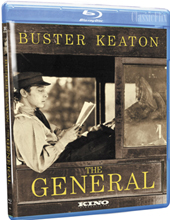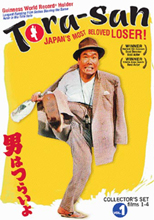
Theatrical Films
This week’s holiday season blockbuster release is Angels and Demons (Sony, $28.96, 2-Disk $36.95, BD $39.95), the second major production based on the conspiratorial hokum of novelist Dan Brown. Excellent talent both behind the camera (director Ron Howard, writers Akiva Goldsman & David Koepp, and cinematographer Salvatore Totino) and in front of it (Tom Hanks, Ewan McGregor, Stellan Skarsgard, and The Eternal City) can’t save Brown’s illuminati saga from itself, but this film can be sort of fun if taken with a barrel full of salt. Interestingly this second adventure of Harvard “Symbologist” Robert Langdon earned more than two-and-one-half times as much ($352.5 million) overseas as it did domestically ($133.3million).
As the holidays approach the number of major theatrical releases grows. This week’s crop is augmented by two major comedies, Four Christmases and Funny People. The critics typically give Vince Vaughan’s comedy films a hard time, but audiences appear to have the opposite reaction. Four Christmases (New Line, $28.98, BD $35.98), which was released for the holiday season last year, is no exception. Critics roundly panned this saga of a young couple forced to spend part of their holidays with each of their divorced parents, but it earned a solid $120 million at the box office and is likely to do well on DVD. Funny People (Universal, $29.98, $34.98, $39.98) mixes drama with comedy in a behind-the-scenes tale of a stand-up comedian (played by Adam Sandler), who finds he is dying of a blood disorder. In future years people may be more inclined to favor this attempt by the king of modern comedy directors Judd Apatow (Knocked Up) to take his basic theme of the gradual and difficult maturation process of the modern American man-child in a more serious direction, but the expensive $75 million production fizzled in a fog of unmet expectations at the box office where it earned just $51.8 million.
Also out this week is Robert Rodriguez’s Shorts (Warner Home Video $28.98, BD $34.98), a true kids movie (10 and up) that harkens back to The Little Rascals in its episodic format, but with a frenetic pace and the gross-out humor that contemporary kids like. With its wildly fantastic plot Shorts may be too over the top for some, but it represents a big step up from Rodriguez’s The Adventures of Sharkboy and Lavagirl, and at least Rodriguez is trying to make films for the underserved kid and tween demographic.
Blu-ray Re-Releases
Sometimes, as in the case of the BD edition of the 1950s Ray Harryhausen science fiction film 20 Million Miles to Earth, the hi-def Blu-ray format appears to be largely wasted on a black-and-white film that was already available in a standard DVD, which looks almost as good as the Blu-ray. But such is not the case with Kino’s Blu-ray edition of Buster Keaton’s 1926 silent film The General ($34.95), which was mastered in high definition from a 35mm archive print struck from the original negative. As Orson Welles points out in his introduction to the film (one of several interesting extras included), The General is the most “authentic” film ever made about the Civil War. The “period feel” of the film in terms of its costumes, hairdos, firearms and the trains themselves has never been equaled. There are no bad process shots in The General, which was filmed almost entirely on location, and there are no cheesy miniatures used either. The shot of The Texas meeting its fate was done without special effects and was the most expensive single shot of the entire silent era.
Keaton actually wanted to use the actual locomotive from the chase, which was indeed called “The General,” but some Confederate war veterans heard that Buster was going to make a comedy about the Civil War and intervened at the last minute to prevent it. But Keaton found similar engines that were still being used in a narrow gauge logging line in
Kino’s Blu-ray of The General presents the film in all its sepia-toned glory, preserving the details in the panoramic longshots, the textures of the homespun costumes, and the unmatched natural lighting effects such as the jaw-dropping shot of Union army troops advancing through the woods, their forms half-obscured by the clouds of smoke from their weapons. The General has often, and quite justly, been compared to the photographs of Matthew Brady in its visual style, but it is the Brady photos brought to life, animated by a fluid camera style with traveling shots that would make Max Ophuls jealous.
Although it is filled with laughter and brilliantly executed gags, The General is not Keaton’s funniest films, even if it is his finest. Here he is stretching the medium of silent comedy to include a wartime adventure that was firmly rooted in an actual event (“The Great Locomotive Chase”). In The General Keaton generates a far more tangible reality and much more visceral excitement than other silent comedians managed in their attempts to exploit conflicts for laughs such as Harold Lloyd’s Grandma’s Boy or Chaplin’s Shoulder Arms. As Orson Welles points out, The General truly is a film that deserves that “over-used, and often devalued term, masterpiece.” It is certainly one of the finest films of the silent era and one of the best American films ever made. The fact that it was left off the AFI’s list of the “100 Greatest American Films,” is a total travesty.
The Kino Blu-ray also contains a number of superb extras including a choice of three different accompanying scores, a video tour of the original “General” locomotive at the Southern Museum along with a complete description of the events of “The Great Locomotive Chase,” a survey of the locations where the film was shot, some priceless home movies made by citizens of Cottage Grove during the filming, Orson Welles’ heartfelt and probing introduction, and “The Buster Express,” a montage of Keaton train gags put together by Kino.
Also out on Blu-ray for the first time this week is Gillian Armstrong’s 1979 film My Brilliant Career, based on the proto-feminist novel by Australian writer Miles Franklin (Stella Maria Sarah Miles Franklin). The film has been re-mastered in high definition under the supervision of the original director of photography Donald McAlpine (Moulin Rouge).
Foreign Films
One of the most interesting releases of the year for anyone interested in Japanese films and Japanese culture is the Tora-San Collectors Set 1 (Animeigo, $79.98). The box set contains the first four films in a 48-film series that featured the stocky, square-faced Kiyoshi Atsumi as Torajiro Kuruma, an itinerant middle-aged peddler/con man, the kind of character that Damon Runyan might have created if he were Japanese. The series began in 1969 just as the Japanese economy was in full flight, and the loveable loser Tora-San was already an anachronism as was the tight knit
All but two of the Tora-san movies were directed by Yoji Yamada, who wrote the screenplays for all of them. Yamada, who also helmed the Oscar-nominated film The Twilight Samurai, has a Capra-like approach to his characters and depicts segments of Japanese society rarely seen by outsiders accurately and lovingly. Credit should be given to Animeigo’s production of the Tora-san DVDs, which include excellent commentaries and production notes that explain many of the nuances of Japanese life, culture and comedy contained in the films. Viewers who don’t speak Japanese would be well advised to keep the remote close by since the dialogue is rapid-fire and Animeigo has added explanatory titles at the top of the screen that translate street signs, explain references, and point out puns and various kinds of wordplay such as Tora-san’s Cockney rhyming slang-like sales patter.
The other major foreign film release of the week is as relentlessly searing as Tora-san is ultimately endearing. Matteo Garone’s
Anime
Funimation is launching an intriguing new series this week. Bamboo Blade: Part 1 ($59.98) includes the first 13 episodes of a rollicking anime about a competition between two kendo teams composed of high school girls, which is based on the manga series (published here by Yen Press) by Masahiro Totsuka. The hero of the highly comic Bamboo Blade is an impoverished high school teacher who enthusiastically enters his high school kendo squad in a tournament in order to win a year’s supply of sushi. Part II, which includes the final 13-episodes, is due out in January.
Sentai Filmworks is also releasing a new series this week, Tears to Tiara: Collection 1 ($39.98), the first half of the 26-episode 2009 anime that just finished its run in
The third new multi-disk release of the week is Rental Magica Part 1 Collection (Right Stuf/Nozomi, $49.98), a deft blend of mystery, romance, horror, comedy and supernatural elements. The 4-disc box set includes the first 12 subtitled-only episodes of the anime, which is based on the light novel series by Makoto Sanda about a young man with no magical powers who has to take over the family business, a magician dispatch service. Like Haruhi Suzumiya the Rental Magica series was not broadcast in chronological order, and this collection includes the first 12 episodes in both broadcast and chronological order.
Also out this week are the second multi-disk releases from three excellent series, the contemporary ninja drama, Nabari: The Complete Series Part Two (Funimation $59.98), Sgt. Frog: Season One, Part 2 (Funimation $39.98), which includes episodes 14-26 of the hilarious alien invasion saga, and Nana: Uncut Box Set, Vol. 2 (Viz Media $59.98), the fine anime adaptation of Ai Yazawa’s manga series produced by Madhouse.
Although multi-disc releases are increasingly the norm for anime in the
Capping off a huge week for anime releases are Blu-ray editions of two classic anime features from Production I.G., Blood the Last Vampire ($29.97) and Ghost in the Shell 2.0 Edition ($29.97) from Manga Entertainment.
Documentaries
We may be living in the golden age of documentary filmmaking, but there is a great tradition in that category and it’s wonderful to see a neglected work like Kent Mackenzie’s 1961 film about the bleak existence of American Indians living in the rundown Bunker Hill neighborhood of Los Angeles, The Exiles (Milestone $29.99), finally get a release on DVD. Structured like a neo-realist feature, the film loosely follows a day in the lives of a group of young Native Americans living in the Victorian mansions that were already shabby when described by Raymond Chandler in the 1940s: “They are all rooming houses now, their parquetry floors are scratched and worn through the once glossy finish and the wide sweeping staircases are dark with time and with cheap varnish laid on over generations of dirt. In the tall rooms haggard landladies bicker with shifty tenants. On the wide cool front porches, reaching their cracked shoes into the sun, and staring at nothing, sit the old men with faces like lost battles.” Sherman Alexie introduces The Exiles and the DVD includes a number of short films about the history of LA and the
Also out this week is Mondovino: The Complete Series (Kino, $59.95), a four-disc documentary by Jonathan Nossiter that explores viniculture around the world and celebrates individuality in an increasingly standardized world. The ten hour-long episodes examine the nature of winemaking largely through probing one-camera interviews shot by Nossiter on what appears to be a digital camcorder. Despite its stylistic limitations, this is one documentary that oenophiles will definitely want to see.
TV on DVD
In the 1990s Warner Animation revamped its treatment of the DC superheroes with a more serious and modern approach that debuted in Batman: The Animated Series and continued in Superman: The Animated Series, which aired on the Kids WB from 1996-2000. Superman: The Complete Animated Series (Warner Home Video, $53.98) contains all 53 episodes on eight double-sided discs. Collectors would undoubtedly prefer dual-layer discs to the easily-scratched double-sided ones, but they will likely still want to own what many consider to be the definitive modern cartoon version of the Man of Steel, thanks to the efforts of a first rate voice cast (Dana Delaney, Malcolm McDowell, Lori Petty, Brad Garrett, and Gilbert Gottfried) and to a nifty balance between the humorous and the darker elements of the super-powered character who too often comes off in other venues like a humorless boy scout.
Other complete collections out this week include Hogan’s Heroes: Kommandant’s Kollection, The Komplete Series (Paramount, $179.80), a 28-disc compendium that includes all 168 episodes of the WWII prison camp farce, and Laredo: The Complete Series (Timeless Media, $99.98), which contains the 56 episodes of the NBC Western series about a trio of Texas Rangers that appeared in primetime from 1965-1967.
Single Season collections include the fourth season of Alfred Hitchcock Presents (Universal, $39.98), which contains all 36 episodes of the suspense-filled show that aired in the 1958-1959 season and featured a galaxy of stars including Steve McQueen, Bette Davis, Claude Rains, Art Carney, Walter Matthau, and Brian Keith to name a few. Other collections include the eighth season of the original Beverly Hill 90210 (
“Best of” collections worth noting include The Best of Spike Jones (Infinity, $29.98), which features the “masters of musical mayhem” at their insane best, and The Jerry Lewis Show (Infinity, $24.98), which collects the some of the best bits from The Jerry Lewis Show that aired on NBC from 1967-1969.












